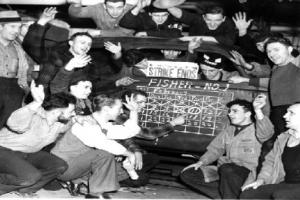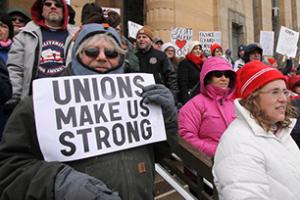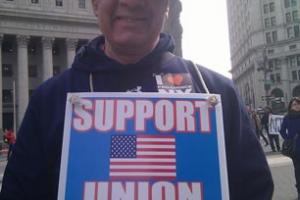100 Days, 100 Ways Trump Has Hurt Workers
Economic Policy Institute
 At the center of the liberal democratic system, workers have fiercely resisted exploitation through the development of worker-based organizations rooted in the ideal of paving the road to a classless and democratic society. All those seeking greater labor militancy must recognize that traditional unions are unable to escape the trap set in the 1930s through fidelity to the collective bargaining agreement. [An earlier version was published by CounterPunch.]
At the center of the liberal democratic system, workers have fiercely resisted exploitation through the development of worker-based organizations rooted in the ideal of paving the road to a classless and democratic society. All those seeking greater labor militancy must recognize that traditional unions are unable to escape the trap set in the 1930s through fidelity to the collective bargaining agreement. [An earlier version was published by CounterPunch.]
 This is the last installment of our National Labor Relations Act Judicial Amendment series, but it is not the end this issue. You will see that we provide action information, so that you can participate in a rebirth of the NLRA. There are many doors and windows through which you can enter this struggle. We encourage you to make suggestions in the comments section about ideas for restoring the NLRA, and please invite people to read the series.
This is the last installment of our National Labor Relations Act Judicial Amendment series, but it is not the end this issue. You will see that we provide action information, so that you can participate in a rebirth of the NLRA. There are many doors and windows through which you can enter this struggle. We encourage you to make suggestions in the comments section about ideas for restoring the NLRA, and please invite people to read the series.
 In the Lechmere case, the Supreme Court rejected the clear language of the NLRA and Congress' intent by judicially amending the NLRA to limit the definition of employee to "an employee of an employer." In doing so, the court gave greater weight to the employer's property rights, which are nowhere mentioned in the NLRA, than to the clearly protected rights of the employees to join together.
In the Lechmere case, the Supreme Court rejected the clear language of the NLRA and Congress' intent by judicially amending the NLRA to limit the definition of employee to "an employee of an employer." In doing so, the court gave greater weight to the employer's property rights, which are nowhere mentioned in the NLRA, than to the clearly protected rights of the employees to join together.
Spread the word